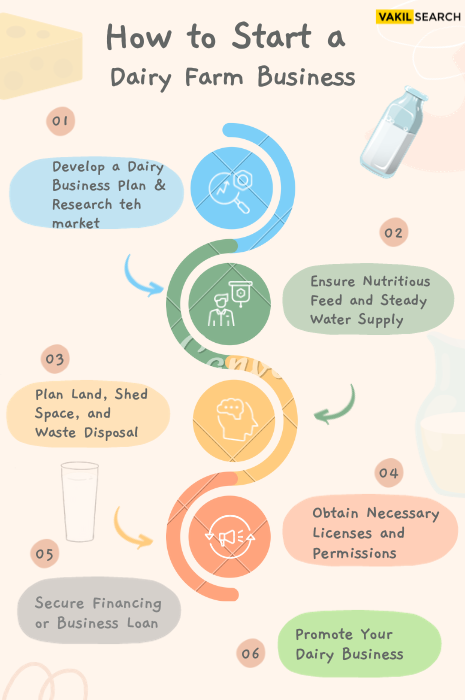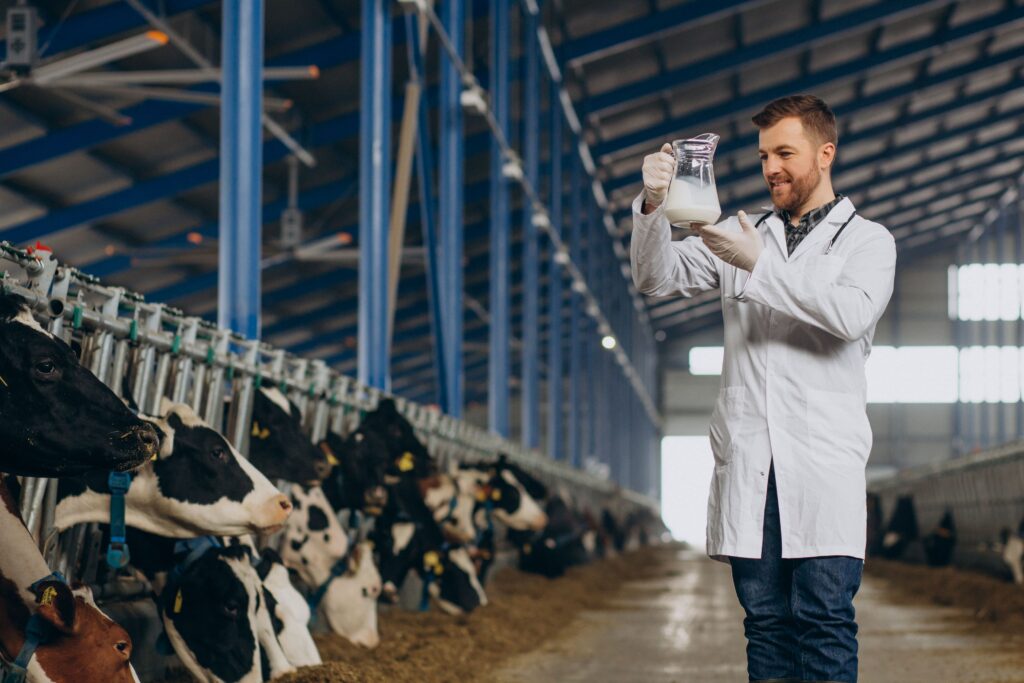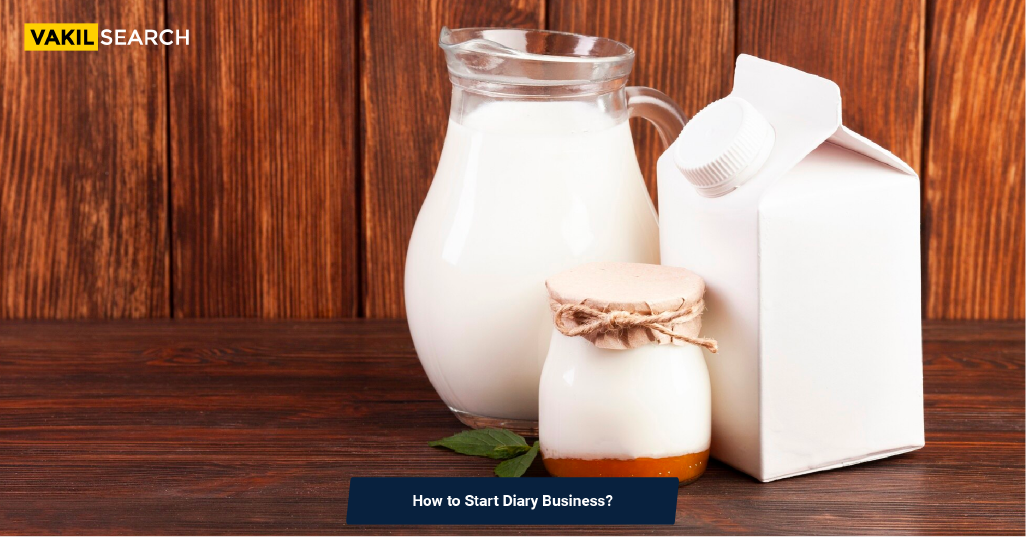Get a full guide on essential steps for aspiring dairy entrepreneurs, helping them establish a profitable and sustainable dairy operation. Understand the basics
Dairy Farm Business in India
Dairy farm businesses in India are a vital component of the agriculture sector, contributing significantly to milk production and rural livelihoods. It involves the rearing of dairy animals, primarily cows and buffaloes, for milk and milk-based products. As the demand for dairy products continues to rise, dairy farm owners need to focus on modern and sustainable practices, improved animal husbandry, and quality milk processing to succeed in this competitive and essential industry.
Did you know?
India is the world’s largest producer of milk, accounting for 23% of global production. Milk production in India has grown at a compound annual growth rate of 6.2%, from 14.63 crore tonnes in 2014-15 to 20.99 crore tonnes in 2020-21. Starting a dairy farm business in India is a great way to contribute to the nation’s success story and become a part of this growing industry.
How to Start a Dairy Farm Business in India?

- Frame a good dairy business plan: This will help you to define your goals, strategies, and financial projections.
- Conduct market research and study: Understand the demand for milk and dairy products in your area, as well as the competition.
- Purchase nutritious fodder and ensure a steady supply of water for your animals: This is essential for maintaining the health and productivity of your livestock.
- Plan for land, shed space, and waste disposal: You will need to have sufficient land to accommodate your animals and to grow fodder, as well as a well-ventilated shed to protect them from the elements. You must also have a plan in place for disposing of animal waste in an environmentally friendly manner.
- Complete the legal formalities and obtain the necessary licenses and permissions. This may vary depending on your location, so it is important to research the specific requirements in your area.
- Secure a dairy farm business loan or other financing from a bank: This can help you cover the startup costs of your business.
- Market your dairy business: Let people know about your products and services through effective marketing strategies.
How Much Does It Cost to Start a Dairy Farm in India?
The cost of starting a dairy farm in India varies depending on a number of factors, such as the size of your operation, the breed of cattle you choose, and the cost of land and feed in your area. However, you can expect to spend at least ₹10 lakhs to ₹15 lakhs to get started.
Benefits of the Dairy Business in India
There are a number of benefits of PVT limited company registration of dairy farm business in India, including:
- High demand: There is a high demand for milk and dairy products in India, which means that there is a large market for your products.
- Government support: The Indian government provides a number of subsidies and incentives to dairy farmers.
- Lucrative returns: Dairy farming can be a very lucrative business, especially if you are able to manage it efficiently.
Limitations of the Dairy Business in India
There are also some limitations to starting a dairy farm business in India, including:
- High startup costs: The company registration costs of a dairy farm business can be high, especially if you are starting on a large scale.
- Perishable products: Milk and dairy products are perishable, which means that they need to be sold or consumed quickly. This can be a challenge if you are not able to find a consistent market for your products.
- Labour-intensive business: Dairy farming is a labour-intensive business, so you will need to have a sufficient workforce to manage your operation.

How to Select the Best Breed for Your Dairy Business?
The best breed for your dairy business will depend on a number of factors, such as your climate, the availability of feed, and your target market. Some popular dairy breeds in India include:
- Sahiwal: This breed is known for its high milk production and its ability to thrive in hot and humid climates.
- Holstein Friesian: This breed is also known for its high milk production, but it is not as well-suited to hot and humid climates.
- Jersey: This breed is known for its high milk fat content and its ability to thrive in a variety of climates.
- Gir: This breed is known for its high milk production and its ability to thrive in hot and dry climates.
It is important to do your research and choose a breed that is well-suited to your specific circumstances. You should also consult with experienced dairy farmers to get their recommendations.
Dairy Farm Business FAQs
Does the Indian Government Give Any Subsidies to Small-Scale Milk Dairy Business Owners?
Yes, the Indian government provides various subsidies and financial support schemes to promote small-scale milk dairy businesses and the dairy sector in general. These subsidies may include assistance for purchasing dairy equipment, improving animal husbandry practices, and establishing milk collection centers. The specific subsidies and eligibility criteria may vary by state and region, so it's advisable to contact local agricultural or dairy development authorities for detailed information.
How to Start a Dairy Business Without Enough Savings?
Starting a dairy business without sufficient savings can be challenging, but it's not impossible. You can explore the following options:
- Bank Loans: Consider applying for loans from banks or financial institutions that offer agricultural and dairy-related financing.
- Government Schemes: As mentioned earlier, explore government subsidies and financial support programs designed to assist dairy farmers.
- Partnerships: Collaborate with other individuals or organizations willing to invest in or partner with your dairy business.
- Bootstrapping: Begin on a smaller scale and reinvest profits to gradually expand your business.
- Crowdfunding: Explore crowdfunding platforms to raise capital from a broader audience.
Is the Dairy Products Business Profitable?
The profitability of a dairy products business depends on various factors, including the size of the operation, location, efficiency of dairy management, milk yield per cow, and market demand for dairy products. When managed well, dairy farming can be profitable, but it requires careful planning, efficient practices, and knowledge of the dairy industry.
How much does it cost to start a dairy farm in India?
The cost of starting a dairy farm in India can vary widely depending on factors such as the size of the farm, the number of animals, infrastructure requirements, and location. Small-scale dairy farms may require an initial investment of several lakhs of rupees, while larger farms with more animals and modern facilities can cost several crores or more.
How many cows do you need to start a dairy farm?
The number of cows needed to start a dairy farm depends on your business goals and capacity. Some small-scale dairy farms may start with just a few cows, while larger commercial dairy farms can have hundreds or even thousands of cows. It's essential to consider factors like available land, resources, and market demand when determining the herd size.
What is the full form of Amul?
The full form of Amul is Anand Milk Union Limited. Amul is a renowned dairy cooperative based in Anand, Gujarat, India, and it's one of the largest dairy organizations in the world.
What are the legal requirements for setting up a dairy farm?
The legal requirements for setting up a dairy farm in India include:
- Registration: Registering your dairy farm with the local agricultural or dairy development department.
- Animal Welfare: Complying with animal welfare laws and regulations, including proper housing, nutrition, and healthcare for dairy animals.
- Milk Testing: Ensuring milk quality and safety by adhering to standards and testing requirements.
- Environmental Regulations: Adhering to environmental regulations, such as waste management and pollution control.
- Business Licenses: Obtaining any necessary business licenses and permits.

